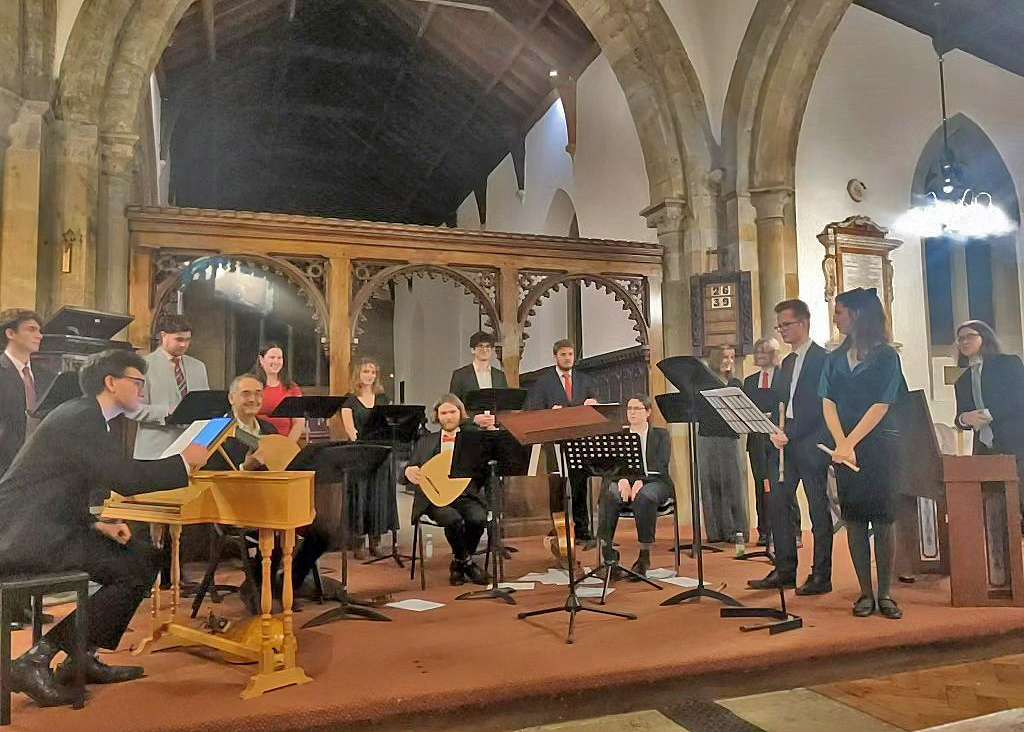Early December is a rather unstable time of year, as I find myself lurching back and forth between Advent and Christmas events and when I’m Queen, all Christmas concerts and festivities will be moved to their proper place in twelve days after 25 December to make way for the dark mysteries of Advent. In the real world though, this evening’s concert by the university’s early music ensemble, The Dunelm Consort and Players, showed how to do a Christmas concert in early December that looked ahead to the joyful story of the nativity without losing the more complex moods of contemplation and expectation that characterise Advent.
This evening’s group comprised eight singers and seven instrumentalists, playing keyboards, lutes, viol and recorders, forming a nicely balanced consort and dressed in festive touches of red and green. The first section of the programme was given over to unaccompanied voices, beginning with Tomás Luis da Victoria’s setting of the great Advent text Conditor alme siderum (‘Creator of the stars of night’). The eight singers were well blended and their ensemble was enviously tight, which carried them well through one or two slightly hairy moments. The two conductors, Stellaria Ciampolini Vukelic and Adam Chillingworth, shaped each piece thoughtfully, with lovely contrasts of light and shade. The Alleluias in Victoria’s glorious O Magnum Mysterium were particularly effective and I enjoyed the sinister heaviness that underpin. ned the gentle lilt of the Coventry Carol and the dark tone of Thomas Tallis’s O Nata Lux.
Two movements of a recorder sonata by Elizabeth Jacquet de la Guerre, played by Amelia Awan with Adam Chillingworth accompanying on virginals heralded the introduction of the instrumentalists. The unadorned melody of the slow first movement and the livelier second was a nice pivot point in the programme and were played delightfully.
The rest of the programme combined voices and instruments and started to feel gently festive. Hector Sequera introduced the traditional carol Angelus ad Virginem with a delicate lute improvisation before everyone launched into a joyful chorus. There were some complicated rhythmic shifts in these pieces that were well handled, with just the lightest direction from Adam Chillingworth at the keyboard, particularly in Orlando de Lassus’s Resonent in Laudibus. The two sopranos, Edie Tunnicliffe and Beatriz Ferraz de Oliveir gave a clear-toned agile introduction to a cheerful account of the angels visiting the shepherds, Angelus ad Pastores Ait by Raffaella Aleotti.
The penultimate piece on the programme and the heftiest work of the concert caused me some confusion as La Guerra by Mateo Flecha didn’t seem to be very Christmassy from the title, nor from the bits of the Spanish text that I could pick out (this is a reflection on my rusty Spanish, not the diction of the singers, which was very good throughout). It would have been nice to have either programme notes or spoken introductions to some of the less familiar pieces, as well as full names of the composers.
Even without us having the words, the Dunelmians gave it so much dramatic colour and performed with such vigour, that there was no doubt that La Guerra was about war, full of battle noises and with ecstatic cries of victory following a more sombre section. A trip online, with rusty Spanish speeded up by Google Translate, tells me that is about the battle between good and evil and the coming of the great captain, Christ – thus returning to another Advent theme.By contrast, the final piece on the programme needed no introduction – a rousing performance of Gaudete, with bells and whistles in the form of a tambourine and some elaborate decoration from Amelia Arwan on sopranino recorder made for a fun end to this delightful concert.
‘A Dunelm Christmas’, Dunelm Consort and Players, directed by Stellaria Ciampolini Vukelic and Adam Chillingworth.
Tuesday 3 December 2024, St Oswald’s Church








